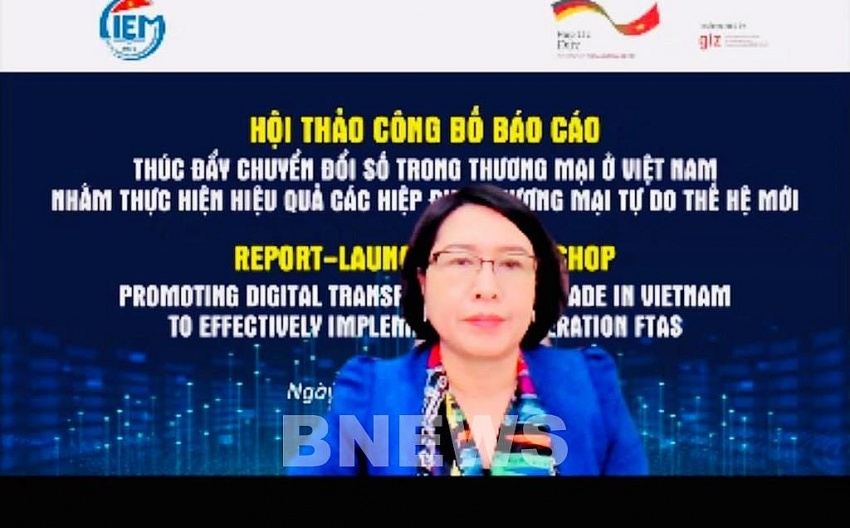Promoting digital transformation in trade to effectively implement new-generation FTAs
 |
| Experts from CIEM and GIZ discussed Vietnam's digital transformation to unlock new-generation FTAs |
The Ministry of Planning and Investment's Central Institute of Economic Management (CIEM) in collaboration with the German Agency for International Cooperation (GIZ) has launched a report on promoting digital transformation in trade in Vietnam to effectively implement new-generation free-trade agreements (FTAs).
The report focuses on three contents. Firstly, it analyses international trends and experiences in digital transformation to support trade in countries like South Korea, Switzerland, China, the EU, and Singapore.
Secondly, it reviews the legal framework, implementation, and related requirements to promote digital transformation in trade activities associated with commitments on e-commerce in new-generation FTAs. It also reviews the current situation of digital transformation in commerce related to digital infrastructure, telecommunications, fintech, and logistics.
Thirdly, it outlines requirements and roadmap for completing the legal framework and implementing digital transformation in commercial activities.
At the workshop to launch the report, CIEM director general Tran Thi Hong Minh said that over the last 36 years (1986-2021), trade growth has always been attached to major socioeconomic development achievements of the country, such as economic growth and poverty reduction. Especially, even amid difficulties since 2018 such as the US-China trade war and the COVID-19 pandemic, the growing export turnover has remained a spotlight of the economy.
This not only creates positive spillover effects on income, jobs, and supply chains but also reflects the efforts and innovation of Vietnam's businesses. Catching up with the trends and good practices of digital transformation in trade has contributed to improving the resilience of Vietnamese enterprises and commercial activities.
In the opinion of Nguyen Anh Duong, head of CIEM's General Research Department, Vietnam has been doing its utmost to apply digital transformation in trade activities. Specifically, the prime minister has adopted Decision No.1968/QD-TTg on November 22, approving the project on "Strengthening the application of information technology and digital transformation for trade promotion activities during the 2021-2030 period."
Vietnam has been perfecting the legal framework and policies to promote digital transformation in trade and various areas like intellectual property, customs, digital infrastructure, non-cash payment and fintech, as well as logistics. Activities have been flexible and built on commitments in new-generation FTAs while considering the needs of industry and providing room for local enterprises to cooperate with foreign partners.
Vietnam also issued supportive policies for innovation activities to support digital transformation, along with a series of ongoing tasks related to the building of the laws on e-transactions and digital economy, e-government, and digital technology.
Digital transformation is also affirmed as an important solution for the economy to overcome the adverse crisis caused by the COVID-19 pandemic. However, in the opinion of economist Le Dang Doanh, Vietnam's digital transformation policies have not been effective enough in recent years. So he recommended that authorities should clearly analyse the advantages and obstacles of digital transformation activities for every economic sector to see how they are applying digital transformation to find good case studies to learn and follow.
Sharing the same opinion, CIEM researchers proposed that Vietnam learn from the experiences of other countries. It is necessary to pay attention to outstanding experiences in perfecting relevant laws and policies; setting up specialised agencies to promote digital transformation; focusing on industries and fields that can make breakthroughs; building information infrastructure; creating favourable conditions and providing appropriate support for enterprises; dealing with adverse effects that may arise.
"Especially, we should utilise more efforts in perfecting policies, towards a complete ecosystem for digital commerce. This is an even more urgent issue in the context of Vietnam's insistence on the effective implementation of new-generation FTAs," he added.
What the stars mean:
★ Poor ★ ★ Promising ★★★ Good ★★★★ Very good ★★★★★ Exceptional
Themes: Digital Transformation
- PM sets five key tasks to accelerate sci-tech development
- Ho Chi Minh City launches plan for innovation and digital transformation
- Dassault Systèmes and Nvidia to build platform powering virtual twins
- Sci-tech sector sees January revenue growth of 23 per cent
- Advanced semiconductor testing and packaging plant to become operational in 2027
Related Contents
Latest News
More News
- VinaCapital launches Vietnam's first two strategic-beta ETFs (February 26, 2026 | 09:00)
- PM sets five key tasks to accelerate sci-tech development (February 26, 2026 | 08:00)
- PM outlines new tasks for healthcare sector (February 25, 2026 | 16:00)
- Citi report finds global trade transformed by tariffs and AI (February 25, 2026 | 10:49)
- Vietnam sets ambitious dairy growth targets (February 24, 2026 | 18:00)
- Vietnam, New Zealand seek level-up in ties (February 19, 2026 | 18:06)
- Untapped potential in relations with Indonesia (February 19, 2026 | 17:56)
- German strengths match Vietnamese aspirations (February 19, 2026 | 17:40)
- Vietnam’s pivotal year for advancing sustainability (February 19, 2026 | 08:44)
- Strengthening the core role of industry and trade (February 19, 2026 | 08:35)

 Tag:
Tag:
























 Mobile Version
Mobile Version